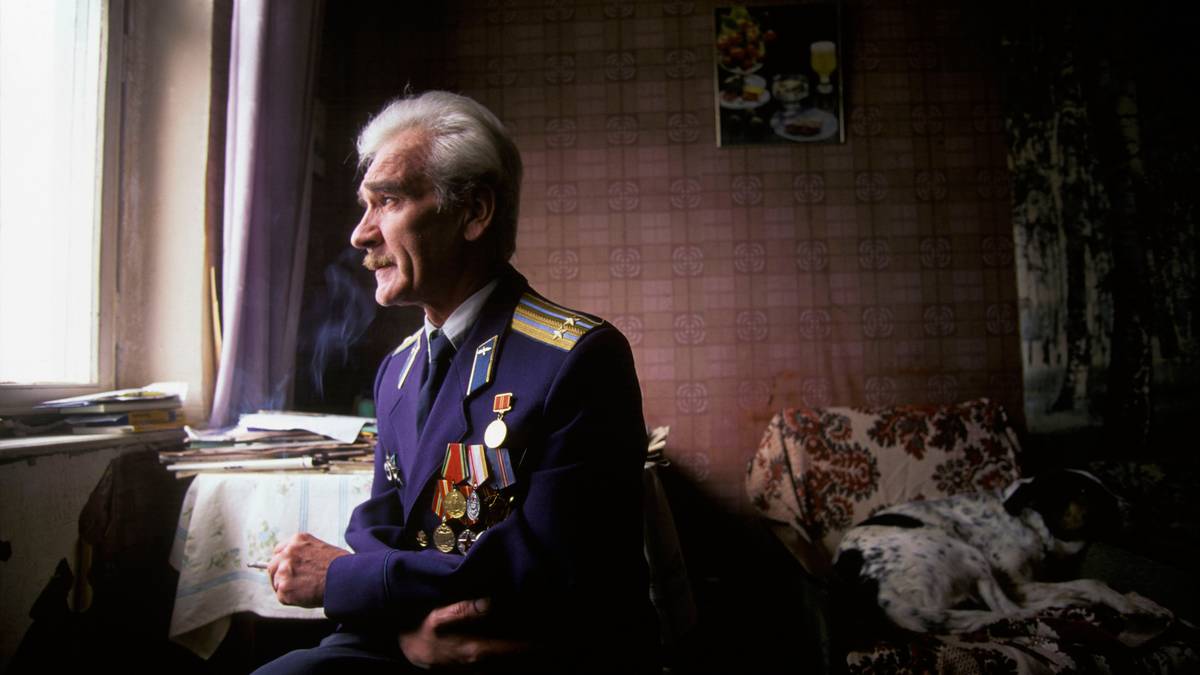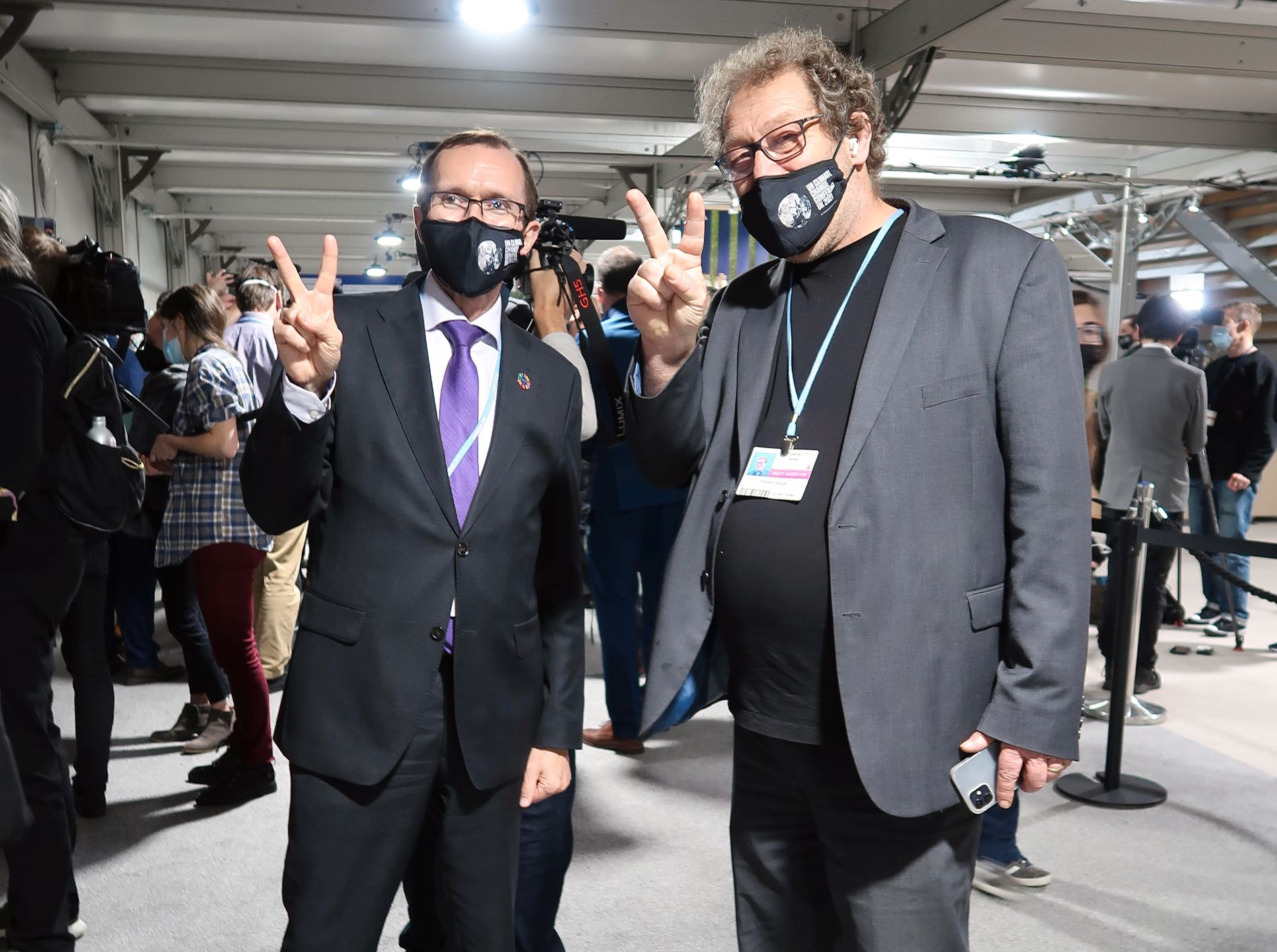It was after midnight. Stanislav Petrov was on duty in a secret command post to monitor nuclear weapons. The walls around it were layers upon layer of thick concrete.
The Russian had attended a military college in Kyiv, the capital of Ukraine. But the lieutenant colonel was not an officer in the Ukrainian army.
His job was to defend soviet union, the communist dictatorship that was in a cold war with the United States after World War II until the late eighties. Both the Russians and the Americans had enough nuclear weapons to destroy the world many times over.
The date was September 26, 1983.
Little did people in New York, who might have been cooking dinner, knew the 44-year-old would soon make sure they could sleep safely.
– I’m not a hero. “I was in the right place at the right time,” Petrov said in the Danish documentary The Man Who Saved the World.

Lieutenant Colonel Stanislav Petrov was responsible for monitoring nuclear weapons via satellites for the Soviet Union.
Photo: Pavel Golovkin / AP
Evil Empire
When Petrov sat in the bunker a few hours earlier, it had been three weeks since Soviet fighter jets shot down a Korean airliner on its way from New York, USA, to Seoul, South Korea.

This map shows the route taken by the KAL 007 passenger plane, and what is the usual route from the United States to South Korea.
Illustration: CIA / Wikimedia Commons
Instead of flying the usual route outside the Soviet Union, the Korean pilot took a “shortcut”. This error caused Korean Air Flight 007 to fly over the Kamchatka Peninsula, southeast Russia. The Soviet fighters followed. They suspected that the passenger plane was involved in espionage operations.
An hour later, and at least two warning shots, the plane was brought down. 269 people died.

Ronald Reagan was President of the United States from 1981 to 1989. He used harsh language against the Soviet Union early in his presidency.
Photo: Ira Schwarz/Ap
US President Ronald Reagan called it a massacre, and used its downing as an additional reason to deploy cruise missiles in West Germany. They should be able to take less than 10 minutes to get to Moscow.
It’s been less than half a year since Reagan dubbed the Soviet Union an “evil empire.”
In the documentary, Stanislav Petrov said that the situation could not be worse.
– One wrong move and everything will go to hell.
alarm clock
When Petrov took command of the dugout, he got a delivery from those who were going to bed.
All systems worked as they should, the presenter and the others performed their duties.
The Soviet Union had several satellites in space that would alert them as soon as possible if the United States launched ICBMs loaded with nuclear weapons. At least one of them monitored the airspace over the United States on September 26.
Something happened at 00:15 Russian time. Something completely unusual.
The alarm started to howl. On the screens in front of them, Soviet soldiers saw the word “launch” in large red letters. The computer system reported the launch of a nuclear missile from a US military base on the West Coast of the United States.
Stanislav was the most responsible person in the bunker. He ordered the others to check the systems.
Only about 20 minutes passed until the bomb fell somewhere in the Soviet Union.
What will Petrov do? Do you notify management? Will they respond with an attack that leaves the United States in ruins?
Race
Stanislav Yevgravović Petrov was born in Vladivostok in 1939, the year Adolf Hitler began World War II.
The Russians grew up under the communist dictatorship of Joseph Stalin, with the United States as the greatest enemy.
The first atomic bomb attack on Hiroshima and Nagasaki in Japan, was at the moment when Petrov was about six years old. Both cities were completely destroyed by one of the worst weapons created by mankind, and more than 230,000 people died.
Before he was 13, the Soviet Union had also acquired nuclear weapons.
There was a race to annihilate the enemy. In elementary schools in the United States, children were trained to throw themselves under their desks in the event of a nuclear attack.
According to Petrov himself, he did not really want to join the army as a young man. It was his parents who pushed him to the defense.
– He said in the Danish documentary that they saved me the trouble of looking after me.
He was educated at a military college in Kyiv, the current capital of Ukraine.
In 1972, he started in the Soviet Air Force, working his way higher and higher in the system.

Stanislav Petrov went into the ranks of Soviet defense before leaving his job in 1984.
Photo: Nikolai Ignatieff / Alami Stock Photo
When the 1980s began, the relationship between the Soviet Union and the United States entered a new and more dangerous phase. In the midst of all this, Petrov continued to go to work as usual.
But nothing was as usual on this autumn night.
doubt
US Minuteman missiles, which can be launched from Earth, will fly into space, before eventually being launched towards their target.
Soviet space probes were tasked with reporting whether the background of the unusual firing of rockets into cold space was.
In the computer systems that Petrov was observing, there was no doubt. The signal was completely reliable. Infrared devices that were supposed to pick up heat from the nuclear missile confirmed it was on its way.
But in addition to space probes, the Soviet Union had radars that could detect missiles. Petrov wasn’t sure what the computers were telling him.
He wanted confirmation from the radars.
Missiles on the way
Then the screens in the bunkers lit up again.
The second missile launch. Then the third, fourth and fifth, he said in an interview with the BBC.
The computers in front of him changed the note. Suddenly she said, “Rocket attack.”
Only a few minutes had passed since he learned of the first missile.
– Within 15 minutes they will appear on radar screens. He said in the same interview, after a while it was exploding over the heads of our people.
The military forces of the Soviet Union would be put on full combat alert if the alarm sounded more.
– Ballistic missiles with more than 11,000 warheads. They wanted to bring in the bombs Hiroshima and Nagasaki To look like a game!

More than 230,000 Japanese were killed by two American atomic bombs at the end of World War II.
Photo: Stanley Troutman/Ap
He believed that all the Soviet staff had to do was press a few buttons.
– I understood that no one would test me. Nobody will dare. They will agree. And what if I’m wrong?
For every minute Petrov and others spent in the bunker assessing whether the systems were right or wrong, the country’s leadership lost time to He decided for what they should do.
System error
Petrov came out limping. He wasn’t sure if the computer systems could be trusted.
There was no rule about how long we could think before reporting an attack. But we knew that every second of procrastination was wasting valuable time. He added that the military and political leadership of the Soviet Union should be notified without delay BBC.
Finally he made up his mind.
Pick up the phone and call the headquarters.
He said it was just a bug in the alarm system.
If he gets it wrong, it won’t be long before the first nuclear bomb goes off.
– After 23 minutes it became clear to me that nothing had happened. If it was a real attack, I would already know. It was a huge relief.
theories
In the aftermath, Petrov and the others searched desperately for why the systems were warning of an attack that would never come. But they did not know for sure how the error occurred.
– It was obvious that the universe was playing tricks on us.
In the past, there were several theories about what actually happened. Was it sunlight hitting some clouds that fooled the Soviet early warning system? Or was it something else entirely? No one could know for sure.
Petrov did not receive an award from the leaders of the army or the leaders of the communist dictatorship. Instead, it was criticized for not properly logging the computer error.
Less than a year later, he quit the military to take care of his cancer-stricken wife. He is also said to have had several nervous breakdowns after the dissolution of the Soviet Union and the final end of the Cold War.
Do you prevent the Day of Resurrection?
The Soviet Union and the United States had massive amounts of nuclear weapons in the 1980s. According to an American report from 1979, an all-out nuclear war will lead to them 130 and 290 million people Came to die in a short time.
In 2013, Stanislav Petrov was awarded the German Peace Prize for avoiding nuclear war. But it is not certain that his decision was entirely decisive because the world did not end with nuclear catastrophe in 1983.
Pavel Budwig is a researcher at the United Nations Institute for Disarmament Research. In addition, he manages the site Russian forces Which collects information on Russian nuclear weapons. He is one of the people who knows the most about how nuclear weapons systems worked in the Soviet Union.

Pavel Budvig is one of the world’s leading experts in the field of Russian and Soviet nuclear weapons.
Photo: Russian Forces Project
He says the Soviet system, unlike the American system, was not prepared to respond to a nuclear bomb attack based solely on what their warning systems had told them.
Instead, the Soviet Union was willing to wait for the first atomic bombs to hit them, before using their nuclear weapons.
Among other things, many in the Soviet defense were skeptical about the computer systems they had. So was Petrov.
– His story shows that people are an important part of this. It is important that people are not like robots, which only transmit signals from one place to another. Budwig tells NRK that it’s important for people to make such decisions and to think about them.
extremely confidential
Stanislav Petrov kept secret from everyone what happened in the bunker on September 26, 1983. Not even his wife found out what he didn’t do.
The story did not become known until the late 1990s. Then one of his superiors wrote a book about his life.
Stanislav Petrov passed away on May 19, 2017.
He himself had no doubt that if he confirmed an attack, many people would die. He said this in the Danish documentary.
– Do you think that nuclear weapons will be used again?
– I think so, yes. It’s absurd. We learned nothing from the past. We must learn to live together as brothers. Otherwise, we will die like dinosaurs.
(Source: The Man Who Saved the World Documentary, BBC, Russian Forces Project, Fox)

“Coffee trailblazer. Certified pop culture lover. Infuriatingly humble gamer.”




